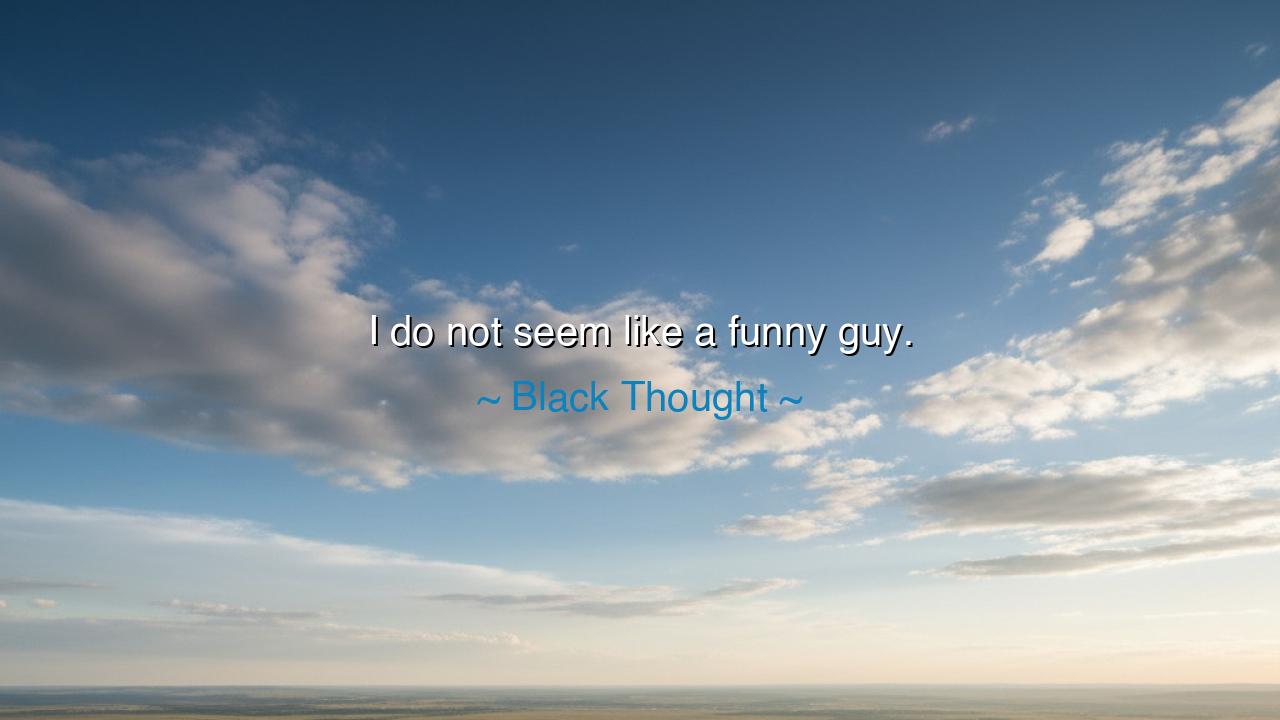
I do not seem like a funny guy.






In the words of Black Thought, “I do not seem like a funny guy.” — there lies not a confession of limitation, but a reflection of perception. These words, simple as they sound, speak to the gulf between how we appear and who we truly are. In their humility burns a deeper truth: that the human soul is vast, layered, and not easily known by surface sight. Black Thought, the philosopher of rhythm and rhyme, reminds us that depth often wears a solemn face, that those who carry wisdom or pain may not always wear the colors of laughter — yet within them may reside the richest understanding of life’s humor.
To seem is not to be. The world is full of those who mistake stillness for coldness, gravity for gloom, silence for pride. Yet, as the ancients taught, the river that runs deepest flows most quietly. So it is with the man who does not “seem funny.” It is not that he lacks joy, but that his joy is not loud. His humor may be born not of jest, but of insight; not of mockery, but of awareness. The wise man does not need to perform laughter — he understands it. For laughter is not the mark of a fool; it is the language of resilience, often mastered best by those who have endured sorrow.
In the days of the Stoic philosophers, such truth was honored. The Roman sage Marcus Aurelius, known for his austere bearing, was said by his soldiers to possess “a smile that belonged to the soul, not the face.” He seemed cold, yet his writings overflowed with compassion. His humor was quiet — the humor of perspective, the knowledge that life, in all its chaos, was still beautiful. Like Black Thought, Aurelius did not seem lighthearted, yet within him burned a calm joy born of understanding. To those who seek only appearances, he seemed distant; to those who listened deeply, he was profoundly human.
Black Thought, born of Philadelphia’s streets and the soul of hip-hop, stands in this same lineage of hidden strength. His art is sharp, his presence grounded, his words etched with the discipline of a philosopher-warrior. He is the poet who wears armor made of intellect and rhythm. When he says he does not “seem like a funny guy,” it is with knowing irony — for true humor, the humor of endurance and clarity, flows beneath the surface of his craft. His is not the laughter of denial, but of wisdom hard-earned, the humor of a man who has seen life’s contradictions and chosen not bitterness, but grace.
The origin of this truth lies in the ancient understanding that one’s essence cannot be measured by appearances. The mask — in Greek drama, called the persona — is both protection and performance. Every soul wears one. The artist, the leader, the thinker — all must appear composed even when storms rage within. Yet to acknowledge, as Black Thought does, that one does not seem light is itself an act of honesty. It invites others to look deeper, to recognize that even solemn faces can hold joy, that even quiet spirits can carry fire.
The lesson here is profound: do not judge others by their masks, nor yourself by how the world perceives you. You need not appear cheerful to possess joy, nor seem entertaining to hold beauty within. True humor, true warmth, true wisdom — these are not costumes to be worn but truths to be lived. The greatest souls are often misunderstood, their light mistaken for shadow, their silence for absence. But the wise know that to be real is more important than to seem bright.
Therefore, my child, do not seek to be seen as funny, kind, or clever — seek instead to be true. Let your laughter arise from authenticity, not performance. If you are serious, let your seriousness be noble; if you are lighthearted, let your joy be sincere. Remember that the oak does not envy the rose for its color, nor the rose the oak for its strength. Each reveals beauty in its own form. Likewise, your quiet strength may be the very balance the world needs.
And so, as Black Thought teaches, there is no shame in not seeming like the “funny guy.” The truest humor comes not from jest, but from understanding the paradoxes of life — from seeing the absurdity of the world and smiling anyway. Live with that kind of laughter — silent, steady, and wise. For in a world obsessed with appearances, the soul that dares to be genuine, even in solemnity, becomes the rarest and most powerful kind of light.






AAdministratorAdministrator
Welcome, honored guests. Please leave a comment, we will respond soon